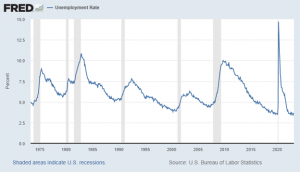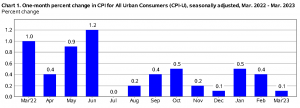By blocking a routine increase in the debt ceiling, the House GOP is trying to blow up the economy. What Americans don’t understand is how bad that would be, because the current economy is about as good as it gets.
Before we discuss details, let’s be clear that this column is about policy, not messaging. Most Americans continue to feel economic pain and it will take time before they feel differently. So, empathize with residents’ concerns, even when they may be inaccurate or untimely.
JOBS:
The unemployment rate—3.5 percent in March—is spectacularly low. After all, except for the even-lower January 2023 unemployment rate of 3.4 percent, March 2023 matched the lowest levels since 1969. And unemployment has been nearly cut in half over the past two years.

You didn’t know unemployment is incredibly low? That’s probably because the few times the media talk about low unemployment, they treat it as a warning sign. Pundits are always saying “the sky is falling.” A tight labor market increases wages, they complain. For heaven’s sake, increasing wages for average Americans is excellent.
INFLATION:
Since July 2022, inflation has totaled only 2.4 percent – an annual rate of 3.2 percent – and there is simply nothing wrong with 3.2 percent inflation.

You didn’t know inflation is so low? That’s because the media almost uniformly use a 12-month average when reporting on inflation. The current 12-month average is 5 percent. The purpose of using averages is to de-emphasize occasional outliers. But a 12-month average is simply inapplicable in this case because a significant change, which started in July 2022, has continued for three consecutive quarters. Historically, 3.2 percent is pretty low inflation, there’s no need for the Federal Reserve to try and drive it lower. The Fed’s killing of two banks is quite enough.
RECESSION:
If the House GOP doesn’t ignite a fiscal bonfire by refusing to lift the debt limit, the economy will probably remain strong because legislation enacted by Biden in 2021 and 2022 will keep things going. This includes:
* The $1.2 trillion Infrastructure Investment and Jobs Act, see this map of infrastructure spending;
* The $738 billion Inflation Reduction Act, which also lowers health care costs and allows Medicare to negotiate drug prices for the first time; and
* The $280 billion CHIPS and Science Act, which boosts domestic research and manufacturing of semiconductors in the U.S.
Ironically, the conservatives’ refusal to reform our immigration system limits the number of potential workers, which tends to drive up wages and keep unemployment low.